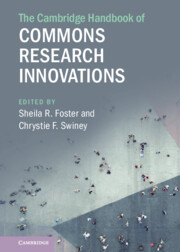Book contents
- The Cambridge Handbook of Commons Research Innovations
- The Cambridge Handbook of Commons Research Innovations
- Copyright page
- Contents
- Figures
- Tables
- Contributors
- Introduction
- Part I Revisiting the Origins and Evolution of Commons Thought
- Part II Averting New Tragedies
- Part III New Forms of Contested Commons
- 7 Reimagining Urban Public Housing as a Commons
- 8 Humanitarian Aid as a Shared and Contested Common Resource
- 9 The Economic System as a Commons
- Part IV Urban Landscape and Infrastructure as a Commons
- Part V Reassessing Old and New Institutions for Collective Action
- Part VI Managing and Restoring the Commons
- Part VII Law, Legal Theory, and the Commons
- Part VIII Technology, the Internet, and the Future of Commons Governance
- Index
8 - Humanitarian Aid as a Shared and Contested Common Resource
from Part III - New Forms of Contested Commons
Published online by Cambridge University Press: 29 October 2021
- The Cambridge Handbook of Commons Research Innovations
- The Cambridge Handbook of Commons Research Innovations
- Copyright page
- Contents
- Figures
- Tables
- Contributors
- Introduction
- Part I Revisiting the Origins and Evolution of Commons Thought
- Part II Averting New Tragedies
- Part III New Forms of Contested Commons
- 7 Reimagining Urban Public Housing as a Commons
- 8 Humanitarian Aid as a Shared and Contested Common Resource
- 9 The Economic System as a Commons
- Part IV Urban Landscape and Infrastructure as a Commons
- Part V Reassessing Old and New Institutions for Collective Action
- Part VI Managing and Restoring the Commons
- Part VII Law, Legal Theory, and the Commons
- Part VIII Technology, the Internet, and the Future of Commons Governance
- Index
Summary
Intuitively, much research in commons research focuses on collaborative governance of environmental resources. At the same time, due to the pressures of climate change, the number of natural disasters will only increase, and humanitarian crises are already on an uptake. As a result, I aim to extend this line of inquiry in my discussion of humanitarian aid as a shared and contested common resource. I take the example of the 2013–2016 West Africa Ebola Epidemic, which occurred along the border of three countries with different institutional histories.Drawing on interviews with 100 civil society organizations and domestic NGOs, I illustrate how top-down management of the 2013–2016 Ebola Response by governmental and international organizations led to policy failure, only until local organizations were involved. Ebola unveils the inefficiency of neglecting local actors, typical in international humanitarian response. In addition, contestation of humanitarian aid resources viewed as “commons” by recipients and “private” by international aid organizations fuels tensions in the aid relationship, and particularly during a crisis where local buy-in is essential.
Keywords
- Type
- Chapter
- Information
- The Cambridge Handbook of Commons Research Innovations , pp. 89 - 99Publisher: Cambridge University PressPrint publication year: 2021



